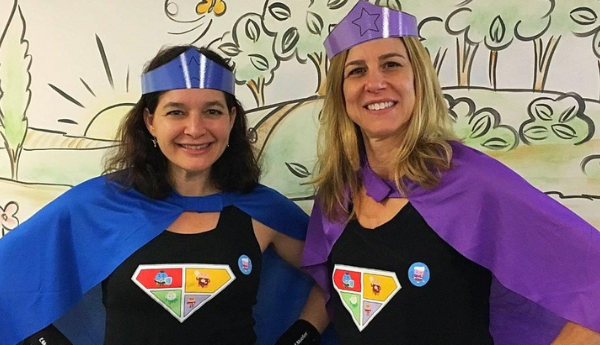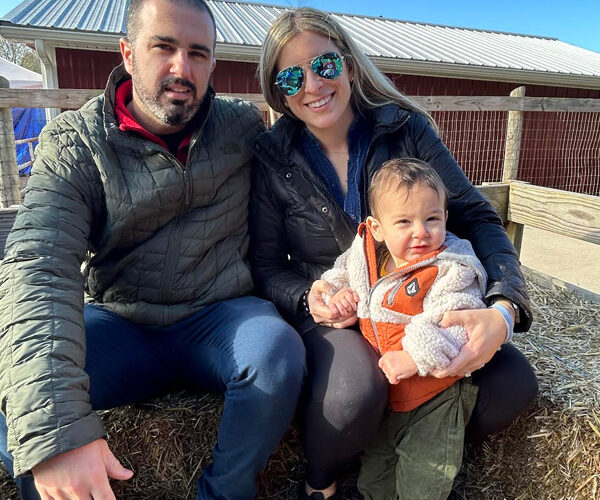Making Healthy Eating Fun
Chicken nuggets and mac ’n cheese are popular meals for children. They’re quick, they’re easy, and the kids typically put ‘em down; another meal- thank goodness!
But parents… not so fast!
For 2019, JCC Early Childhood Health Educators Janene Malamud and Laura Fink are advocating slower, healthier, and more mindful eating and moving for children.
Janene, a Baltimore native and health educator with the J’s Early Childhood Education Center, has taught and served many a picky eater in the J‘s healthy halls since 2011. Janene and Laura have encouraged hundreds of moms, dads, and grandparents to bring healthy eating home.
Janene and Laura teach the J‘s Healthy Choices Curriculum, where children are introduced to new, healthy foods.
Persimmons, Kale, Quinoa, Kiwi – on a typical day in the JCC kids might try one these during a Healthy Choices class; the key word here being “try,” as developing an awareness of nutritional eating often comes in small steps.
“Touch it, smell it, lick it, and then let’s take a small bite together and taste it,” says Janene. “It all comes back to mindfulness.”
Using the USDA’s My Plate model, which emphasizes healthy portions of fruit, vegetables, lean proteins and grains per meal, the two educators teach children and caregivers how to eat whole foods and avoid processed foods that are high in sugar, saturated fat and sodium.
“We talk to our students about ‘Anytime Foods’ vs. ‘Sometimes Foods,’” says Janene.
“We don’t talk about foods as good or bad. We should enjoy all food, especially foods that help our bodies to grow.”
“Cookies and ice cream are wonderful sometimes but not all the time, while carrots and hummus or a handful of sugar snap peas or apples slices are great anytime.”

Moving into 2019, Janene and Laura have 5 great tips for parents and grandparents:
- Slow down and practice mindful eating. Say a blessing or pause before you eat. Wait until everyone is served and take note of your food and its colors, textures, and smells; appreciate that you are about to enjoy something that is healthy for your body.
- Parents – don’t use food as a punishment or reward, and never force children to eat anything. Don’t get into power struggles. Give kids as much control over their food as possible: “Broccoli or peas, Hannah – you choose.”
- Children have small stomachs, yet we often put a lot of food on their plates. If the expectation is to finish, that can be either overwhelming for a child and they will eat nothing, or they’ll learn to eat everything, which can lead to unhealthy eating behaviors. Serve healthy, manageable, appropriate portions.
- Model healthy behavior and teach your children to MOVE. Eating and exercise go hand in hand. Also, be persistent and positive about trying new foods and make sure there are always healthy foods in the home – it’s all about attitude! Have fun in the kitchen!
- Frozen veggies are great. They have all the same nutrients as fresh veggies because they are typically frozen right away and they will last a lot longer in the freezer than they will in the refrigerator. Plus, they’re easy, quick, and cheap! And, of course, drink lots of H2O and try to drink less sugary drinks like soda, juice and Gatorade – sugar craves more sugar and they are full of unneeded calories.
Subscribe to our newsletter
The Associated is a home for everyone in the Baltimore Jewish community. We offer several email lists to help people find a community, engage with their peers and support Jewish journeys around the world.
Join Our Mailing ListAdd Impact to Your Inbox
Sign up for our newsletter
Subscribe to our newsletter
The Associated is a home for everyone in the Baltimore Jewish community. We offer several email lists to help people find a community, engage with their peers and support Jewish journeys around the world.
Join Our Mailing List









 Please Wait while we loading your video.
Please Wait while we loading your video.